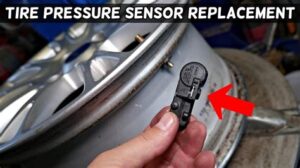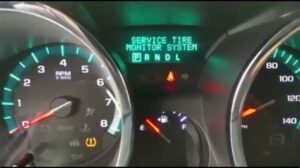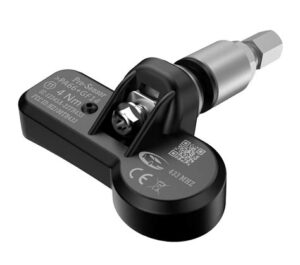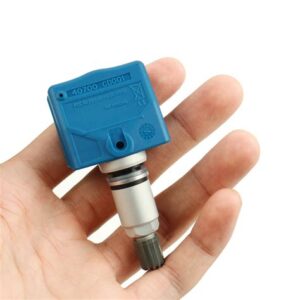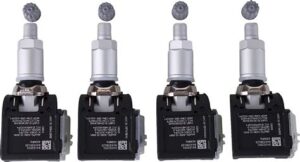Discover the importance of tire pressure monitoring, common TPMS issues, maintenance tips, and benefits for BMW owners in this comprehensive guide.In the world of automotive safety and performance, few components are as crucial yet overlooked as the Tire Pressure Monitor Sensor (TPMS). For BMW owners, understanding this system can make a significant difference in both driving experience and vehicle longevity. The TPMS is designed to keep a vigilant eye on tire pressure, alerting drivers to any deviations that could compromise safety or fuel efficiency. This is especially important given the high-performance nature of BMW vehicles, where every detail matters. In this blog post, we’ll explore what a Tire Pressure Monitor Sensor is, why it’s essential, common signs of TPMS issues, and how to maintain it effectively. We’ll also delve into the benefits of having a well-functioning TPMS, ensuring you can drive your BMW with confidence and peace of mind.
What is a Tire Pressure Monitor Sensor?
A Tire Pressure Monitor Sensor (TPMS) is a crucial component of modern automotive safety systems. Its primary function is to monitor the air pressure inside the tires of your vehicle. The TPMS provides real-time data regarding tire inflation levels, which is a vital factor in ensuring your vehicle’s performance and safety on the road.
There are generally two types of TPMS:
- Direct TPMS: This system uses sensors mounted directly on the tire valves. These sensors measure the tire pressure and send the information to the vehicle’s onboard computer, which then displays it on the dashboard.
- Indirect TPMS: This method doesn’t use pressure sensors. Instead, it relies on the vehicle’s anti-lock braking system (ABS) wheel speed sensors to detect differences in wheel speed that can indicate a change in tire pressure.
The data collected by a TPMS is vital for a number of reasons:
- Prevents accidents due to under-inflated tires, which can lead to blowouts.
- Improves fuel efficiency, as properly inflated tires reduce rolling resistance.
- Increases tire lifespan by ensuring that tires wear evenly.
In summary, a Tire Pressure Monitor Sensor is essential for maintaining optimal tire pressure, which directly impacts the vehicle’s safety, efficiency, and longevity. Understanding how this system works can help you make informed decisions about your vehicle maintenance.
Importance of Tire Pressure Monitoring
Tire pressure monitoring is a crucial aspect of vehicle maintenance, particularly for those who own luxury vehicles like BMWs. Maintaining optimal tire pressure ensures safe driving conditions and enhances vehicle performance. Below, we explore the importance of tire pressure monitoring in detail.
Enhanced Safety
Properly inflated tires are vital for road safety. Under-inflated or over-inflated tires can lead to reduced traction, affecting braking and steering responsiveness. This is particularly critical in adverse weather conditions. With a Tire Pressure Monitoring System (TPMS), drivers are alerted to pressure changes, which helps avoid potential accidents.
Improved Fuel Efficiency
Did you know that maintaining the correct tire pressure can improve your car’s fuel efficiency? Under-inflated tires increase rolling resistance, meaning your car has to work harder to move. According to studies, maintaining optimal tire pressure can enhance fuel economy by up to 3%. This not only saves money at the pump but also reduces carbon emissions.
Extended Tire Life
Regular monitoring of tire pressure can significantly extend the lifespan of your tires. Proper inflation prevents uneven wear and tear, thus improving their durability. By ensuring that your tires are always at the recommended pressure, you can avoid costly replacements and improve performance.
Prevention of Tire Blowouts
Tire blowouts can be dangerous and often result from poor inflation. Monitoring tire pressure regularly minimizes the risk of blowouts and helps maintain optimal tire health. Having a TPMS alerts drivers to any significant drops in tire pressure before they become a hazard.
Maintaining Vehicle Handling
Correct tire pressure is essential for maintaining your vehicle’s handling and stability. Inadequate pressure can cause the vehicle to feel sluggish, affecting cornering performance and overall driving experience. A well-functioning TPMS ensures you have the right information for an excellent driving experience.
Cost-Effectiveness
Investing in a tire pressure monitoring system can save you money in the long run. With the numerous benefits like improved fuel efficiency, reduced tire wear, and the prevention of accidents, the initial expense pays off over time. Additionally, many new BMW models come equipped with advanced TPMS features, making it easier than ever to keep track of your tire health.
In conclusion, the importance of tire pressure monitoring cannot be overstated. For BMW owners and drivers of all vehicles, a functional TPMS is an essential tool for enhancing safety, improving efficiency, and extending the lifespan of tires.
Common Signs of TPMS Issues
The Tire Pressure Monitoring System (TPMS) is an essential feature in modern vehicles, including BMWs, designed to alert drivers when tire pressure falls below a certain threshold. However, like any system, it can experience issues. Here are some common signs that you may have TPMS problems:
- TPMS Warning Light: One of the most obvious signs of a potential issue is the illumination of the TPMS warning light on your dashboard. This light indicates that one or more of your tires may be under-inflated or that there is a malfunction in the system itself.
- Inconsistent Tire Pressure Readings: If you notice discrepancies in tire pressure readings, such as one tire showing a significantly lower pressure than the others, it could indicate a bad sensor or an air leak.
- No Warning Light but Low Pressure: Sometimes, tires may be low on air, but the TPMS light does not activate. This can happen if the sensor has malfunctioned or if it has failed entirely.
- Frequent Low Tire Pressure: If your tires are consistently losing pressure and require regular inflation, it’s important to check for leaks and consider that TPMS sensors might not be functioning correctly.
- Delayed TPMS Alerts: A properly working TPMS should provide prompt notifications when tire pressure is low. If you notice a delay in these alerts, it might suggest sensor issues.
If any of these signs occur, it’s crucial to revisit the TPMS for your BMW. Consulting with a professional helps ensure your vehicle maintains optimal performance and safety.
How to Maintain TPMS
The Tire Pressure Monitoring System (TPMS) is critical for ensuring your vehicle operates safely and efficiently. Proper maintenance of your TPMS not only prolongs its lifespan but also enhances your driving experience. Here are some essential tips on how to keep your TPMS in optimal condition:
- Regularly Check Tire Pressure: It’s important to check your tire pressure at least once a month. Maintaining proper tire air pressure can reduce wear on the TPMS sensors.
- Inspect Sensors for Damage: Visually inspect the TPMS sensors and tire valves for any signs of wear or damage. If you notice any cracks or corrosion, consider replacing them.
- Calibration After Tire Changes: If you replace your tires or change the wheels, make sure to recalibrate the TPMS. This ensures the sensors function correctly and provide accurate readings.
- Battery Maintenance: Many TPMS sensors are powered by batteries that can deplete over time. If your TPMS warning light activates unexpectedly, it may be a sign that the sensor battery needs replacing.
- Utilize Professional Help: Schedule regular check-ups with a qualified mechanic. They can perform a comprehensive diagnostic on your TPMS and identify any underlying issues.
Following these maintenance tips will help ensure that your TPMS functions effectively, keeping you safe on the road. Remember, understanding and maintaining your BMW tire pressure monitor sensor is vital for overall vehicle performance.
Regular maintenance of your TPMS not only enhances safety but also optimizes vehicle performance. – Automotive Expert
Benefits of TPMS for BMW Owners
For BMW owners, maintaining the performance and safety of your vehicle is paramount. One of the key technologies that supports this is the Tire Pressure Monitoring System (TPMS). Understanding the benefits of TPMS can enhance your driving experience and ensure your tires are always in optimal condition.
- Enhanced Safety: Proper tire pressure is crucial for ensuring safety on the road. A well-functioning TPMS alerts you to low tire pressure, reducing the risk of accidents caused by blowouts or reduced traction.
- Improved Fuel Efficiency: Under-inflated tires can lead to increased rolling resistance, which in turn depletes fuel efficiency. With a TPMS, you can maintain the recommended tire pressure, helping your BMW to achieve better mileage.
- Extended Tire Life: Consistent monitoring of tire pressure prevents premature wear and tear. By maintaining correct pressure levels, TPMS helps in extending the lifespan of your tires, saving you money in the long run.
- Increased Performance: For BMW enthusiasts who enjoy the thrill of driving, the performance of the vehicle is a top priority. The right tire pressure, monitored by TPMS, ensures that your BMW handles and responds optimally on the road.
- Convenient Alerts: TPMS provides real-time data and alerts on your tire conditions. This technology saves you time and hassle by informing you immediately if there’s a problem with your tire pressure.
In summary, the benefits of TPMS are invaluable for BMW owners. By taking advantage of this technology, you can enjoy a safer, more efficient, and enjoyable driving experience.
Frequently Asked Questions
What is the purpose of a tire pressure monitor sensor (TPMS) in BMW vehicles?
The TPMS in BMW vehicles is designed to monitor the air pressure in the tires and alert the driver if the pressure falls below a certain threshold, ensuring safety and optimal performance.
How do I know if my BMW’s tire pressure monitor sensor is malfunctioning?
Signs of a malfunctioning TPMS include the warning light on the dashboard staying illuminated, inconsistent pressure readings, or the inability to reset the system after adding air to the tires.
Can I drive my BMW with a faulty tire pressure monitor sensor?
While you can drive with a faulty TPMS, it’s not advisable as it may lead to undetected tire pressure issues that can result in flat tires or blowouts.
How often should I check the tire pressure in my BMW?
It is recommended to check the tire pressure at least once a month and before long trips, as changes in temperature and road conditions can affect tire pressure.
What should I do if the tire pressure monitor sensor light comes on in my BMW?
If the TPMS light comes on, first check the tire pressure in all tires, and if they are correct, you may need to reset the TPMS or have it checked by a professional to determine if there is a sensor issue.
Where is the tire pressure monitor sensor located on a BMW?
The TPMS is usually located within or on each tire’s valve stem as part of the tire pressure monitoring system, so it cannot be easily seen without removing the tire.
How can I reset the tire pressure monitor sensor after adjusting tire pressure?
To reset the TPMS in a BMW, refer to the vehicle’s manual; it usually involves pressing the TPMS reset button or navigating through the onboard computer system to the appropriate settings.
